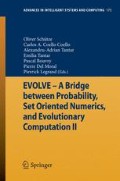Abstract
The averaged Hausdorff distance Δ p is a performance indicator in multi-objective evolutionary optimization which simultaneously takes into account proximity to the true Pareto front and uniform spread of solutions. Recently, the multi-objective evolutionary algorithm Δ p -EMOA was introduced which successfully generates evenly spaced Pareto front approximations for bi-objective problems by integrating an external archiving strategy into the SMS-EMOA based on Δ p . In this work a conceptual generalization of the Δ p -EMOA for higher objective space dimensions is presented and experimentally compared to state-of-the art EMOA as well as specialized EMOA variants on three-dimensional optimization problems.
Access this chapter
Tax calculation will be finalised at checkout
Purchases are for personal use only
Preview
Unable to display preview. Download preview PDF.
References
Schütze, O., Esquivel, X., Lara, A., Coello Coello, C.A.: Using the averaged Hausdorff distance as a performance measure in evolutionary multi-objective optimization. IEEE Transactions on Evolutionary Computation (2012), doi:10.1109/TEVC.2011.2161872
Gerstl, K., Rudolph, G., Schütze, O., Trautmann, H.: Finding evenly spaced fronts for multiobjective control via averaging hausdorff-measure. In: Int’l. Proc. Conference on Electrical Engineering, Computing Science and Automatic Control (CCE 2011), pp. 975–980 (2011)
Mehnen, J., Wagner, T., Rudolph, G.: Evolutionary optimization of dynamic multi-objective test functions. In: Proceedings of the Second Italian Workshop on Evolutionary Computation, GSICE2 (2006); Published on CD-ROM
Beume, N., Naujoks, B., Emmerich, M.: SMS-EMOA: Multiobjective selection based on dominated hypervolume. European Journal of Operational Research 181(3), 1653–1669 (2007)
Pareto, V.: Manual of Political Economy. The MacMillan Press (1971)
Knowles, J., Corne, D.: On metrics for comparing nondominated sets. In: Congress on Evolutionary Computation (CEC 2002), vol. 1, pp. 711–716. IEEE Press, Piscataway (2002)
Zitzler, E., Thiele, L., Laumanns, M., Fonseca, C.M., Grunert da Fonseca, V.: Performance assessment of multiobjective optimizers: an analysis and review. IEEE Transactions on Evolutionary Computation 7(2), 117–132 (2003)
Van Veldhuizen, D.A.: Multiobjective Evolutionary Algorithms: Classifications, Analyses, and New Innovations. PhD thesis, Department of Electrical and Computer Engineering. Graduate School of Engineering. Air Force Institute of Technology, Wright-Patterson AFB, Ohio (1999)
Coello Coello, C.A., Cruz Cortés, N.: Solving Multiobjective Optimization Problems using an Artificial Immune System. Genetic Programming and Evolvable Machines 6(2), 163–190 (2005)
Zitzler, E., Thiele, L.: Multiobjective Optimization Using Evolutionary Algorithms - A Comparative Case Study. In: Eiben, A.E., Bäck, T., Schoenauer, M., Schwefel, H.-P. (eds.) PPSN 1998. LNCS, vol. 1498, pp. 292–301. Springer, Heidelberg (1998)
Beume, N.: S-metric calculation by considering dominated hypervolume as Klee’s measure problem. Evolutionary Computation 17(4), 477–492 (2009)
Deb, K., Pratap, A., Agarwal, S., Meyarivan, T.: A fast and elitist multiobjective genetic algorithm: NSGA-II. IEEE Transactions on Evolutionary Computation 6(2), 182–197 (2002)
Zhang, Q., Li, H.: MOEA/D: A multi-objective evolutionary algorithm based on decomposition. IEEE Transactions on Evolutionary Computation 11(6), 712–731 (2007)
Hastie, T., Tibshirani, R., Friedman, J.: The Elements of Statistical Learning. Springer, New York (2001)
Pateiro-Lopez, B., Rodriguez-Casal, A.: Generalizing the convex hull of a sample: The R package alphahull. Journal of Statistical Software 34(5), 1–28 (2010)
R Development Core Team. R: A Language and Environment for Statistical Computing. R Foundation for Statistical Computing, Vienna, Austria (2011), ISBN 3-900051-07-0
Pateiro-Lopez, B., Rodriguez-Casal, A.: alphahull: Generalization of the convex hull of a sample of points in the plane. CRAN (2011), http://cran.r-project.org/web/packages/alphahull/index.html
Kukkonen, S., Deb, K.: Improved pruning of non-dominated solutions based on crowding distance for bi-objective optimization problems. In: Proc. Congress on Evolutionary Computation (CEC 2006), vol. 1, pp. 1179–1186. IEEE Press, Piscataway (2006)
Kukkonen, S., Deb, K.: A fast and effective method for pruning of non-dominated solutions in many-objective problems. In: Runarsson, T.P., Beyer, H.-G., Burke, E.K., Merelo-Guervós, J.J., Whitley, L.D., Yao, X. (eds.) PPSN 2006. LNCS, vol. 4193, pp. 553–562. Springer, Heidelberg (2006)
Deb, K., Thiele, L., Laumanns, M., Zitzler, E.: Scalable multi-objective optimization test problems. In: Fogel, D., et al. (eds.) Proc. Int’l. Congress on Evolutionary Computation (CEC 2002), vol. 1, pp. 825–830. IEEE press (2002)
Viennet, R., Fontiex, C., Marc, I.: Multicriteria optimization using a genetic algorithm for determining a pareto set. International Journal of Systems Science 27(2), 255–260 (1996)
Mersmann, O.: emoa: Evolutionary Multiobjective Optimization Algorithms, R package version 0.4-8 (2012), http://cran.r-project.org/web/packages/emoa/
Mersmann, O., Trautmann, H., Steuer, D.: mco: Multi criteria optimization algorithms and related functions, R package version 1.0.9 (2012), http://cran.r-project.org/web/packages/mco/
Durillo, J.J., Nebro, A.J.: jMetal: A Java framework for multi-objective optimization. Advances in Engineering Software 42, 760–771 (2011)
Author information
Authors and Affiliations
Corresponding author
Editor information
Editors and Affiliations
Rights and permissions
Copyright information
© 2013 Springer-Verlag Berlin Heidelberg
About this paper
Cite this paper
Trautmann, H., Rudolph, G., Dominguez-Medina, C., Schütze, O. (2013). Finding Evenly Spaced Pareto Fronts for Three-Objective Optimization Problems. In: Schütze, O., et al. EVOLVE - A Bridge between Probability, Set Oriented Numerics, and Evolutionary Computation II. Advances in Intelligent Systems and Computing, vol 175. Springer, Berlin, Heidelberg. https://doi.org/10.1007/978-3-642-31519-0_6
Download citation
DOI: https://doi.org/10.1007/978-3-642-31519-0_6
Publisher Name: Springer, Berlin, Heidelberg
Print ISBN: 978-3-642-31518-3
Online ISBN: 978-3-642-31519-0
eBook Packages: EngineeringEngineering (R0)

